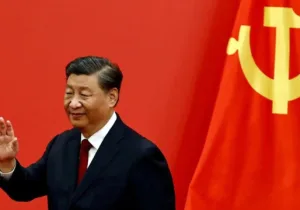In December 2022, Japanese PM Fumio Kishida of the governing Liberal Democratic Party (LDP) announced a doubling of his defense budget over the next five years, intended to make it worth 43 trillion yen ($314bn) by 2027, making Japan the world’s third-largest military spender after the US and China. But how to pay for this, given Tokyo’s long-term economic stagnation in the decades following its famously rapid 1980s stock-market boom and equally fast 1990s bust?
The LDP is split, with one faction, led by Kishida, favoring tax rises on citizens or businesses. This goes against the current doctrine of ‘Abenomics’, a free-market regime of low tax and low regulation, as espoused by the recently assassinated former LDP PM Shinzo Abe. Abe’s loyal remaining Cabinet acolytes think more taxes would stifle economic growth, so call for special government bonds to be sold to the public to raise defense cash instead.
The best way to settle this debate might be to contact the ghost of Abe himself and ask him what he would do. Step forward the Happiness Realization Party (HRP) a politico-religious cult movement led by one ‘Master’ Ryuho Okawa. As we saw in Part One, Okawa is a prolific self-styled channeler of the souls of the eminent dead, most notably his economic heroine Margaret Thatcher, whose sage post-mortem advice he dutifully recorded in his thousands of automatically-written best-selling books.
The Master’s Master-Plan
Exploiting regional traditions of Shinto-style shamanism, on their voluminous website-cum-newspaper The Liberty Web, the ‘Happies’ have run detailed interviews with the ghost of Mrs. Thatcher, whose military and business ideology chimes perfectly with Master Okawa’s own: The Master had previously been a financier in New York during the 1980s Reaganomics boom-years, while today being highly concerned about the immense geo-strategic threat posed by Japan’s nuclear-armed totalitarian neighbors China and North Korea. According to the late British PM: “A small government is preferable … [the Japanese government should] assist the privatization of industries. There are too many laws, which prohibit the growth of private companies, so set them free and educate them to fight for themselves, to obtain prosperity.”
But the ruling LDP was less steely than the Iron Lady. “The Japanese people have a group psychology… that overtaking is a fearful thing,” Okawa has lamented. Whenever GDP began to grow, the nation’s soft-hearted voters demanded the rich be taxed further to combat inequality. Yet this would only counterproductively overburden businesses and make everyone worse off, as Robin Hood-style redistributive economics always does, The Master argued. Thus, one may easily conclude, Fumio Kishida increasing taxes to fund the military would only crash the economy further, leaving generals with even less to spend than they had in the first place.
Financial Suicide
Under the supposedly free-market LDP and their ‘Abenomics,’ Japan risked becoming a unilaterally “pacifist economy,” the Happies prophesized, directly conflating economics with military might. Shinzo Abe may have posed as a Thatcherite, said Master Okawa, but this was all a lie. In 1989, Abe’s LDP predecessors had introduced a consumption tax on goods and services, a Japanese version of Britain’s VAT (Value Added Tax) or the United States’ Sales Tax, causing the economy to begin its decades-long slump as increased prices inevitably dampened consumer spending.
Furthermore, in Master Okawa’s opinion, VAT makes people commit suicide. VAT is a “devilish taxation system,” which causes more deaths than earthquakes, a truly “abnormal circumstance” in geologically unstable Japan. The HRP has drawn graphs supposedly proving a direct correlation between suicides and all successive hikes in VAT from April 1997 onwards, when the surcharge rose from 3% to 5%. In 1997, 24,391 potential Japanese customers killed themselves. By 1998, due to the further 2% increase in the price of goods and services, this number had shot up to 32,863; that’s 8,472 extra victims murdered by tax.
As the HRP argued: “tax increase > depression (financial unrest) > suicide increase.” This was doubly bad, as dead people don’t pay taxes, thus decreasing treasury income, not increasing it as VAT was meant to; as the iconic pro-free-market Laffer Curve graph purports to paradoxically demonstrate, the lower your tax rate, the greater your tax-intake. Yet when tax receipts plummeted, LDP policy-makers responded by increasing VAT even further, leading to ever more deaths. If this vicious cycle of economic evil did not cease, then eventually “Japan will surely become an unprecedented suicide country,” the HRP warned.
The Rice Age
Why could Japan’s elite not see the error of their ways? Because the LDP’s leaders were suffering from “tax-karma,” a severe condition triggered by previous mismanagement of macroeconomic matters during their past lives. In 2011, the HRP psychically interviewed the (living) astral body of the country’s then-PM, Yoshihiko Noda, about his plans to increase taxes even further.
Why was Noda doing this? “No … well … to be honest, I don’t really know much about taxes,” his spirit admitted. “That’s certainly what it looks like, yes,” said Liberty Web chief interrogator, Jiro Ayaori. Noda explained how the country’s unaccountable civil servants set MPs’ fiscal agendas for them, like unelected puppeteers. “Politicians are amateurs,” explained Noda, who only exist “to make bureaucrats happy.” A politician’s only job was to promise voters the impossible – in Noda’s case, that an increase of VAT to 10% would boost prosperity, not suicide – then hope they had already left office before it became evident their plan had failed.
In a previous life, Noda had supposedly worked as guardian of a rice warehouse, during Japan’s feudal Edo Period. In those far-off days, rice could be used by farmers to pay their taxes, in lieu of money. When famine hit, the tons of valuable rice locked inside Noda’s bank-cum-warehouse meant the peasants starved when food was actually easily available. Noda tried to avoid moral liability by claiming, as a mere security guard, to have had no understanding of the matter, as “the market was something the merchants did.”
The wrathful Shinto and Buddhist gods disagreed, and so when later reborn in his current body, Noda’s suffering soul had sought out the position of PM, where it would be possible for him to “make the right decision on taxes” and thereby “graduate from his [bad] tax-karma” by making “his spirit-level … rise.” But, being used to tax being paid in food, Noda succeeded only in making “a foolish judgment on the tax problem” by increasing VAT yet again, meaning he will “again have tax issues in his next life.” The Happies deplored how such financially illiterate souls could be reborn into top cabinet positions. “It’s a dubious system, isn’t it?” complained Master Okawa.
Initially, this all sounds like literal economic insanity, but upon closer inspection is merely a heightened, cartoonish extrapolation of actual mainstream political currents in Japanese society: the LDP’s desire to grow the economy and thereby help double Japan’s defense budget in light of the growing regional threat from Beijing and Pyongyang is actually entirely rational, wise and laudable. Reading The Liberty Web can thus give you a surprising level of insight into the forces driving current Japanese foreign, military and economic policy. After all, you can’t write a check with rice in 2023.





